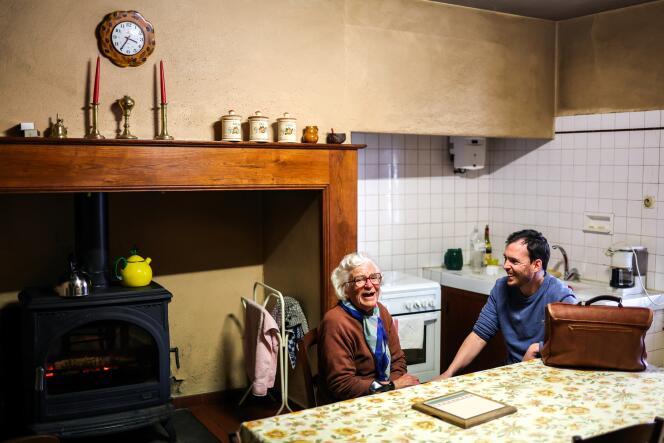The gentleman was 94 or 96 years old, Cory Moncoucut no longer knows exactly. His name was Edouard, but she always called him by his last name: “He was a former lawyer, he had a certain presence and it did him good to always be considered”. He also had a tendency to cheat at Scrabble, but she pretended not to notice, rather amused. Cory is 23 years old, she is a fifth year medical student in Bordeaux. For several months, the young woman transformed herself into an “owl” to watch over him at night. The “owls” are health students selected by the start-up Ernesti, a platform that puts them in contact with family caregivers or people losing their autonomy. For a standard night, from 8 p.m. to 8 a.m., the “owl” receives 52.50 euros.
Recently widowed, this old gentleman especially needed company. Until his health deteriorated in the last month. After his death, the family wanted to organize a meal with all the “owls” who took turns from one evening to the next: a time to exchange memories, anecdotes and the many jokes he had made. “I left there very moved, Cory says. It was really beautiful: I realized that we were the people he saw the most, even though most of his friends were dead. I was very sad when he died, I still think about it often. »
By creating these strong links between generations, Ernesti seeks to democratize night shifts at home, in order to limit hospital stays and to postpone sometimes forced entries into retirement homes – with, as a bonus, the idea of breaking away isolation of the elderly. Having just graduated from the Ecole Centrale de Lyon, Quentin Zakoian launched the initiative in 2017 with his twin sister, Séverine, a clinical psychologist, who then went to the bedsides of seniors several nights a week.
“Our mother, a general practitioner in the countryside near Bordeaux, has a fairly elderly patient base. We grew up in that atmosphere”traces the CEO and co-founder of the start-up which today has 17,000 health student registrations throughout France – a third in medicine, a third in nursing and a final third in paramedical training such as speech therapy , physiotherapy or pharmacy.
Sources of motivation
“Depending on the typology of the pathology of the person being supported, we direct them towards the most suitable studentexplains Quentin Zakoian. After support, the young person is no longer the same: he grows and gains professionalism. » Cory Moncoucut testifies: “We manage to take the patient as a whole. During an internship at a hospital, we don’t realize the impact that losing a spouse, for example, can have. It can completely decompensate an elderly person. The pain manifests itself but the cognitive disorders will come to the fore. That’s written in our classes, but we don’t realize it until we see it in real life…” The future general practitioner also observed, in the privacy of a bedroom, what the prescription of a daily treatment entailed: “That’s all we do, prescribe, but I had never thought about everything that needs to be put in place around it: nurses to give the injection, people to prepare the pill bottle, etc. »
You have 44.17% of this article left to read. The rest is reserved for subscribers.
